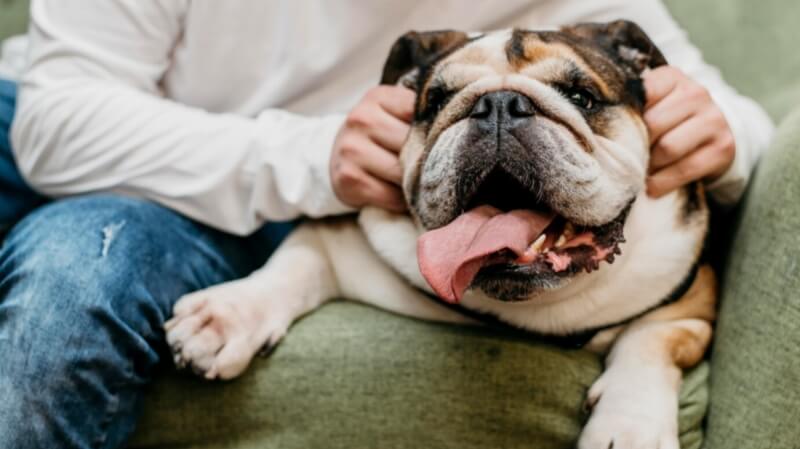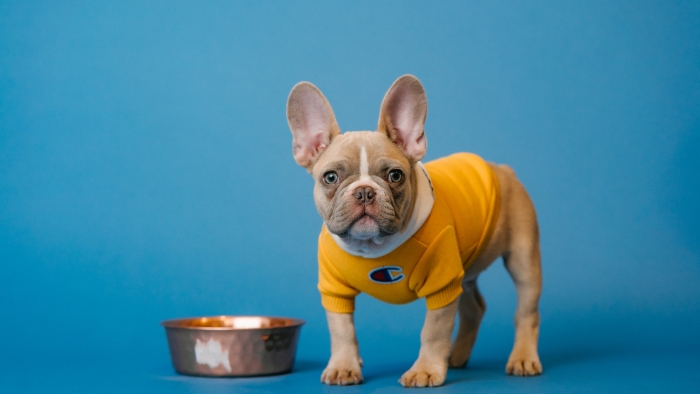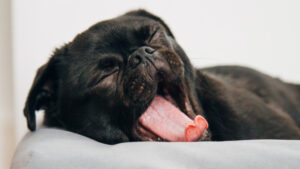
Best Doggie Doorbell:15+ Models Tested for Potty Training
Are you training your doggie doorbell manners, or does your furry friend incessantly scratch or bark at the door to go outside? You need a

Has your dog coughs after drinking water and you’re puzzled about why?
This blog will dive into the common causes and provide practical solutions to keep your pooch happy and healthy.
We’ll also touch on when to seek professional help and the importance of regular health check-ups.
Let’s explore the reasons behind this peculiar behavior and how it impacts your pet’s health.
One potential reason for why your dog coughs after drinking water is throat irritation caused by water triggering their cough reflex. Another common cause is when dogs drink too fast, leading to coughing.
This rapid drinking can cause discomfort and even lead to choking hazards. Dogs, like humans, have a reflex that is triggered when something unexpected enters their throats.

In the case of dogs, drinking too fast or gulping down water can trigger this reflex, leading to a cough. This is often a simple response and not indicative of any underlying health problem.
However, if your dog consistently coughs after drinking water, it might be a sign that they are drinking too hastily. It could also be a sign of an overly sensitive throat or a minor throat irritation.
Sometimes, the reason your dog coughs after drinking water could be more serious, relating to health issues like respiratory infections, allergies, or heart disease that require a vet’s attention.
Respiratory infections, such as kennel cough, can make a dog’s throat more sensitive, leading to coughing after drinking.
Allergies, whether environmental or food-related, can also cause throat irritation and coughing. In some cases, heart disease might be the underlying cause, especially if the coughing is accompanied by other symptoms such as lethargy, difficulty breathing, or a blue tinge to the gums.
It is important to observe any additional symptoms and consult a veterinarian if you suspect your dog’s coughing is more than just a simple reaction to drinking water.
Here are some actionable steps you can take to prevent or minimize this concern.
Providing warm water can help soothe your dog’s throat.
Considering the timing of meals around drinking can also be beneficial. Soft foods or moistening dry kibble may reduce irritation.
Warm water is more soothing to the throat than cold water and can help alleviate any minor irritation.
Additionally, feeding your dog a small amount of soft food before or after drinking can help prevent coughing. The food acts as a cushion for the throat, reducing the impact of the water.
If your dog primarily eats dry kibble, consider adding a bit of water or broth to soften it. This can not only make the food more palatable but also help in reducing throat dryness that might contribute to coughing after drinking.
Encouraging your dog to drink slowly by offering water in smaller portions or using specialized drinking bowls can help. There are bowls designed to slow down fast drinkers, reducing the risk of coughing.
These bowls often have floating obstacles or are maze-like, forcing your dog to drink more slowly and carefully.

This not only reduces the risk of choking and coughing but also aids in better hydration. For dogs that tend to gulp their water, consider providing a constant but limited amount of water throughout the day, instead of filling the bowl to the brim.
This encourages your dog to take smaller, more frequent sips, reducing the likelihood of rapid drinking and subsequent coughing.
If your dog’s coughing persists or if they exhibit other symptoms like lethargy or loss of appetite, consulting a veterinarian is crucial.
They can diagnose underlying health issues and provide appropriate treatment. A vet can conduct a thorough examination, including listening to your dog’s heart and lungs, and may recommend diagnostic tests such as blood work or X-rays. These tests can help identify any underlying conditions that might be causing the coughing.
If an illness like kennel cough or heart disease is diagnosed, your vet will provide the appropriate medications and treatment plans. Always consult a vet if the coughing is persistent, severe, or accompanied by other worrying symptoms.
The choice of water bowl can play a significant role in preventing coughing.
Choose a bowl that allows your dog to drink comfortably without swallowing too much air, reducing throat irritation. Bowls with built-in obstacles or slow-feed designs can be particularly effective. When selecting a bowl, consider your dog’s size and snout length.
A bowl that’s too deep or too shallow can make drinking uncomfortable, leading to faster drinking and more air intake. Anti-gulp bowls, often used for feeding, can also be effective for water.
These bowls have structures that break the water’s surface, requiring your dog to drink more slowly and carefully. This can significantly reduce the likelihood of coughing due to rapid water intake.
Adjusting the height and angle of the water bowl can help your dog drink more naturally, putting less strain on their throat.
Elevated bowls are beneficial for larger breeds or dogs with certain health conditions. An elevated bowl can reduce the need for your dog to bend down too much, which can sometimes lead to faster and more frenzied drinking.
The height should be adjusted so that the bowl is at the level of your dog’s lower chest. This allows them to maintain a comfortable posture while drinking, reducing the strain on their neck and throat.
Additionally, the angle of the bowl can also be adjusted. Some bowls come with adjustable stands that allow you to tilt the bowl, making it easier for your dog to access the water without having to gulp it down rapidly.
Close monitoring of your dog’s habits can provide insights into the coughing issue.
Keep track of when your dog coughs after drinking water to identify any patterns. Note the time of day and the amount of water consumed.
This can help you determine if the coughing is related to a specific behavior or condition. For instance, if your dog only coughs after drinking water following physical activity, it could be due to them drinking too rapidly to quench their thirst.
If the coughing occurs regardless of activity level, it might be due to the way they drink or an underlying health issue.
Keeping a log of these episodes, including details like the duration of coughing and any other observed symptoms, can be valuable information for your veterinarian.
Observing how your dog drinks and their overall behavior around water is important. Some dogs may need encouragement to drink more slowly or take breaks during drinking.
Watch for signs like splashing water, rapid breathing while drinking, or attempts to “catch” the water.
These can indicate that your dog is not drinking properly and may be at risk of coughing. Encourage calm and relaxed drinking by providing a quiet and comfortable drinking spot.
Avoid loud noises or distractions that might cause your dog to drink hastily.
If your dog is competitive about resources, consider providing a separate drinking area away from other pets to reduce stress and rushing.
Look for any relationship between your dog’s eating habits and coughing episodes.
A balanced diet and proper hydration are key to preventing health issues. Sometimes, what your dog eats can affect how they drink.
For example, a diet high in salt can increase thirst, leading to more rapid drinking and potential coughing.
If your dog eats a lot of dry food, they might be more prone to drinking large amounts of water at once. In such cases, consider incorporating wet food into their diet or soaking dry food in water to increase hydration.
Monitor your dog’s eating habits closely and consult with a vet if you suspect their diet might be contributing to the coughing problem.
Here are some products that can help manage your dog’s coughing.
Regular check-ups are essential for early detection of potential health issues.
Routine veterinary check-ups can help identify and prevent health problems in your dog. These check-ups can include blood tests, physical exams, and dental checks.
Regular vet visits allow for early detection of conditions that could lead to coughing, such as dental issues, which can cause discomfort and lead to increased water consumption and coughing.
Blood tests can reveal underlying conditions like diabetes or kidney issues, which might affect how your dog drinks and processes water.
During these visits, your vet can also provide advice on diet, exercise, and water consumption that’s tailored to your dog’s specific needs and health status.
Keeping up with your dog’s vaccination and immunity schedule is crucial for their overall health and well-being.
Vaccinations protect against many common diseases that can cause coughing and other health issues. Up-to-date vaccinations are essential for preventing illnesses that can lead to coughing, such as kennel cough or canine influenza.
These vaccinations are particularly important if your dog frequents dog parks, boarding facilities, or grooming salons where they’re more likely to be exposed to contagious diseases.

Keeping your dog’s immune system strong is key to preventing health issues that can manifest in symptoms like coughing after drinking.
In summary, understanding why your dog coughs after drinking water and addressing it promptly, as well as being aware of other common drinking issues in dogs, is key to their comfort and happiness.
Issues such as drinking too little or too much water can also indicate health problems, requiring careful observation.
By following these tips and consulting with a vet when necessary, you can ensure your furry friend’s well-being and strengthen your bond with them. Remember, a healthy dog is a happy dog!
Through attentive care, observation, and appropriate intervention, you can help manage or even eliminate your dog’s coughing after drinking water, as well as tackle other water-related issues, ensuring they stay hydrated and healthy.


Are you training your doggie doorbell manners, or does your furry friend incessantly scratch or bark at the door to go outside? You need a

When it comes to dog pee, much like humans, the urine of animals is a vital health indicator. Just as human urine reveals a lot

Noticed your dog yawn more often than usual? While it’s adorable, it could also be a sign of something to consider if it appears excessive.

Wondering what’s so fantastic about bell train a dog? Picture a world where your furry friend always alerts you when they need to go outside,

Are you training your doggie doorbell manners, or does your furry friend incessantly scratch or bark at the door to go outside? You need a

When it comes to dog pee, much like humans, the urine of animals is a vital health indicator. Just as human urine reveals a lot

Noticed your dog yawn more often than usual? While it’s adorable, it could also be a sign of something to consider if it appears excessive.

Wondering what’s so fantastic about bell train a dog? Picture a world where your furry friend always alerts you when they need to go outside,
Copyright © 2024 doggydogdoorbell. All Rights Reserved.